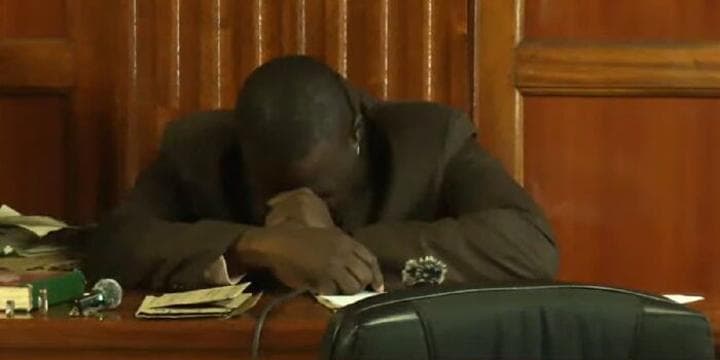We're loading the full news article for you. This includes the article content, images, author information, and related articles.
A former Kayole police boss's emotional testimony in a murder trial highlights the intense dangers faced by officers in Nairobi's high-crime zones, raising critical questions about police welfare and accountability.

A Milimani High Court session on Wednesday, October 29, 2025, was marked by a heavy silence as Senior Superintendent Dennis Omunga, a former Officer Commanding Station (OCS) in Kayole, broke down in tears while testifying. Currently an instructor at the Kenya Police Training College in Kiganjo, Omunga recounted the harrowing realities of policing in one of Nairobi’s most volatile divisions. His testimony came during the ongoing murder trial of six of his former junior officers.
"In total, during the three months I served there, 13 officers were killed while on duty," Omunga told the court, his voice heavy with emotion. He detailed a period of intense insecurity where reports of violent, daylight robberies were a daily occurrence, creating a high-stakes environment for the officers under his command. The testimony painted a grim picture of the constant threat faced by police in areas plagued by organized crime.
The six officers—Corporal Joseph Ojode, Constable Henry Mutai, Constable Bashir Ali, Constable Charles Kirimi, Inspector James Ngige, and Corporal Vincent Odhiambo—are on trial for the murder of Wycliffe Vincent Owuor on March 24, 2020. Owuor was a suspect in a high-profile KSh72 million ATM robbery that occurred in Nairobi West in 2019 and was out on bond at the time of his death.
Omunga testified that on the day of the incident, he dispatched the six officers after receiving a distress call about an active armed robbery at Kayole Junction. According to his account, when the officers arrived, they ordered the suspects to surrender, but the armed men opened fire. The officers returned fire, fatally wounding Owuor, while two other suspects allegedly escaped on a motorcycle. A homemade gun and other items were reportedly recovered from the scene.
The police's version of events is strongly contested. The family of Wycliffe Owuor and some witnesses allege that he was executed after he had already surrendered and been handcuffed. Following the incident, the Independent Policing Oversight Authority (IPOA) launched an investigation. Based on its findings, IPOA recommended that the six officers be charged with murder, a recommendation that the Office of the Director of Public Prosecutions (ODPP) supported, leading to the current trial.
During his testimony, Omunga expressed frustration with IPOA, accusing the oversight body of bias and a lack of concern for officers killed in the line of duty. He claimed investigators seemed to have prejudged the case and did not fully appreciate the dangerous circumstances his officers were operating under. The trial continues to weigh these conflicting accounts, seeking to determine whether the killing of Owuor was a lawful act of self-defense during a police operation or an unlawful extrajudicial killing.
Omunga's testimony has cast a spotlight on the perilous conditions for police officers in Kenya, particularly in crime hotspots like Kayole. While official, localized statistics for the specific period mentioned are not publicly available, national data underscores the risks. In 2023, a report from the Ministry of Interior stated that 37 officers had died in the line of duty in the preceding year. Between late 2021 and late 2023, the total number of officer deaths was 95. These figures, often attributed to banditry and terror attacks, lend credence to the significant dangers faced by law enforcement personnel nationwide.
The conversation around police work in Kenya often centers on accountability and reform, yet the welfare and safety of the officers themselves are critical components of that discussion. Reports and studies have highlighted challenges such as inadequate housing, poor remuneration, and immense psychological stress from daily exposure to trauma. These factors can significantly impact officer performance and morale. The government has acknowledged these issues, with initiatives like the Maraga Report on Police Welfare and recent salary reviews aiming to address these long-standing problems.
The emotional testimony of a senior officer like Dennis Omunga serves as a potent reminder of the human cost of insecurity in Kenya. As the court case proceeds, it brings to the forefront the complex, often tragic, intersection of crime, law enforcement, and the quest for justice for all parties involved.
Keep the conversation in one place—threads here stay linked to the story and in the forums.
Sign in to start a discussion
Start a conversation about this story and keep it linked here.
Other hot threads
E-sports and Gaming Community in Kenya
Active 9 months ago
The Role of Technology in Modern Agriculture (AgriTech)
Active 9 months ago
Popular Recreational Activities Across Counties
Active 9 months ago
Investing in Youth Sports Development Programs
Active 9 months ago